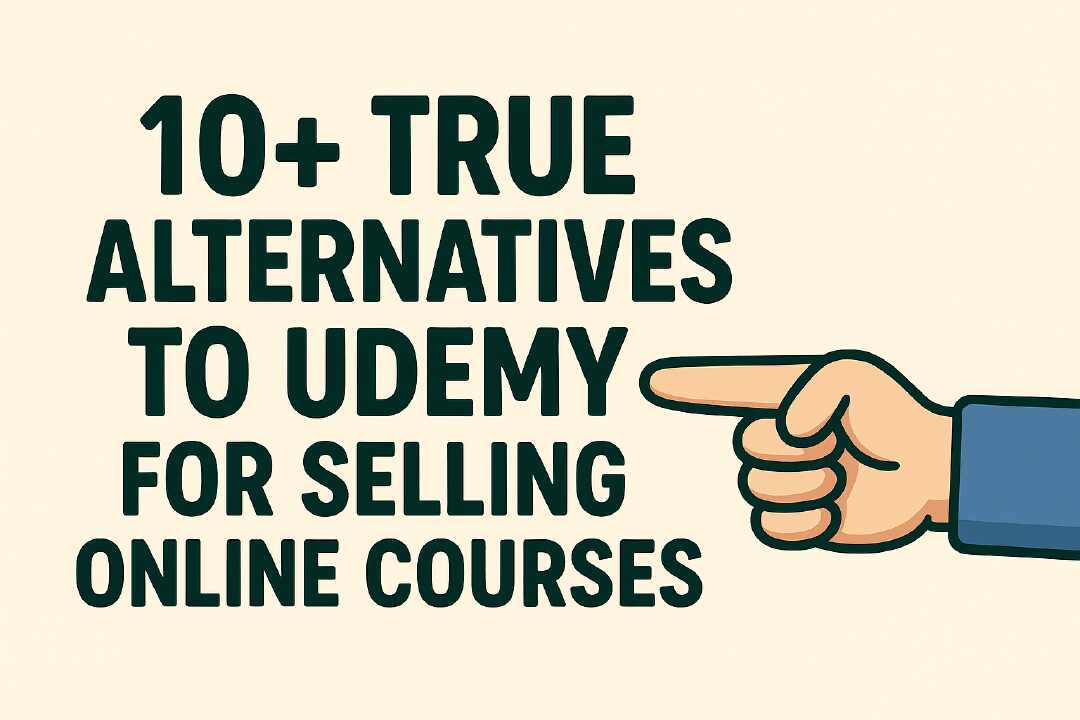Udemy has become a major player in the e-learning world. It’s beginner-friendly, offers a huge audience, and makes it simple to upload courses. But while Udemy is popular, it’s not always the best option for every course creator. You may want more control, better branding, or higher profit margins.
In this guide, we’ll explore 10+ real alternatives to Udemy—platforms that let you sell your online courses on your own terms while providing the flexibility and tools you need to grow your business.
1. Teachable
Type: Course creation platform (not a marketplace)
Key Benefits: Full control over branding, course structure, and student data. You can create quizzes, landing pages, and integrate email marketing tools.
Revenue Model: Monthly subscription with small transaction fees on lower plans, but you keep most of your revenue.
Best For: Creators who want their own branded online school and the ability to sell high-ticket courses.
2. Thinkific
Type: All-in-one online course platform
Key Benefits: A powerful course builder with customization options, built-in marketing tools, and drip content scheduling.
Pricing: Free plan available; paid plans start at around $36/month.
Best For: Instructors who want professional-level courses without the complexity of heavy tech setups.
3. Podia
Type: All-in-one platform for courses, memberships, and digital products
Key Benefits: Very easy to use, supports memberships, webinars, and coaching. Includes email marketing and subscription options.
Pricing: Starts at $39/month with no transaction fees.
Best For: Creators who want simplicity and the ability to sell multiple types of digital products alongside their courses.
4. LearnWorlds
Type: Feature-rich course platform
Key Benefits: Offers interactive video players, ebooks, quizzes, certificates, and even social learning communities. Comes with a no-code website builder and analytics tools.
Advanced Features: AI course builder, mobile app builder, and deep marketing integrations.
Best For: Course creators who want a visually engaging and highly customizable online learning experience.
5. Kajabi
Type: Premium all-in-one business platform
Key Benefits: Handles courses, email marketing, funnels, memberships, communities, and payments all in one system.
Pricing: Starts from around $55/month for basic plans, with advanced plans costing more.
Best For: Coaches and course creators who want a polished, fully automated business ecosystem.
6. Skillshare
Type: Creative skills-focused marketplace
Key Benefits: A community-driven platform where you get paid royalties based on watch time. Great for building a creative brand and gaining exposure.
Best For: Designers, artists, writers, and other creatives looking for visibility and networking.
7. Coursera
Type: MOOC (Massive Open Online Course) platform
Key Benefits: Global reach, university partnerships, and accreditation opportunities. Courses tend to be more formal and structured.
Limitations: Usually not open to individual instructors unless you partner through an institution.
Best For: Accredited educators or organizations offering university-level or professional training.
8. Other MOOC Platforms (edX, FutureLearn, Alison, Udacity, LinkedIn Learning)
Type: Academic and professional learning ecosystems
Key Benefits: Structured programs, certificates, and global learner bases.
Limitations: Generally require partnerships or a professional background to contribute.
Best For: Educators or institutions focused on formal, credentialed courses.
9. Payhip
Type: E-commerce platform for digital products and courses
Key Benefits: Lets you sell courses, downloads, and memberships with a customizable storefront. Can connect to your own domain.
Pricing: Free plan with 5% transaction fee, $29/month for 2% fee, or $99/month with no fee.
Best For: Creators who want a lightweight, affordable platform that integrates easily with their own website.
10. GoSkills
Type: Micro-learning platform
Key Benefits: Mobile-friendly lessons, AI tutor assistance, and professional upskilling focus.
Limitations: Primarily learner-focused—less ideal for independent sellers.
Best For: Professionals and companies looking to deliver short, impactful learning content.
Quick Comparison Table
| Platform | Best For | Key Advantage |
|---|---|---|
| Teachable | Branded online schools | High control & revenue retention |
| Thinkific | Professional courses | Customization + marketing tools |
| Podia | Multi-product simplicity | Easy to use + no extra fees |
| LearnWorlds | Engaging, interactive courses | Advanced features + design flexibility |
| Kajabi | Automated business systems | Funnels + community + all-in-one tools |
| Skillshare | Creative professionals | Exposure + royalties |
| Coursera | Accredited learning | Global reach + institutional credibility |
| edX/FutureLearn | Academic programs | Certificates + structured courses |
| Payhip | Lightweight e-commerce | Simple setup + flexible pricing |
| GoSkills | Micro-learning | Bite-sized lessons + mobile friendly |
Marketplace vs. Self-Hosted Platforms
When choosing an alternative to Udemy, you’ll need to decide between:
Marketplaces (Udemy, Skillshare) – Built-in audience but less control over pricing, branding, and student data.
Self-Hosted Platforms (Teachable, Thinkific, Kajabi) – You own your brand, set your prices, and keep more revenue, but you must handle your own marketing.
Pro Tip: Use a Hybrid Strategy
Many creators use a two-step approach:
Offer a low-cost or “teaser” course on Udemy or Skillshare to attract students.
Invite them to join your main course on your self-hosted platform for more advanced content.
This lets you leverage a marketplace’s audience while still growing your independent brand.
Conclusion
Udemy is a great place to start, especially if you’re new to online teaching. But if you want more control, better profit margins, and full branding freedom, platforms like Teachable, Thinkific, Podia, LearnWorlds, Kajabi, and Payhip are strong contenders.
The right platform for you depends on your goals, technical comfort level, and marketing skills. Test a few, compare the features, and choose the one that aligns with your vision for your online teaching business.



